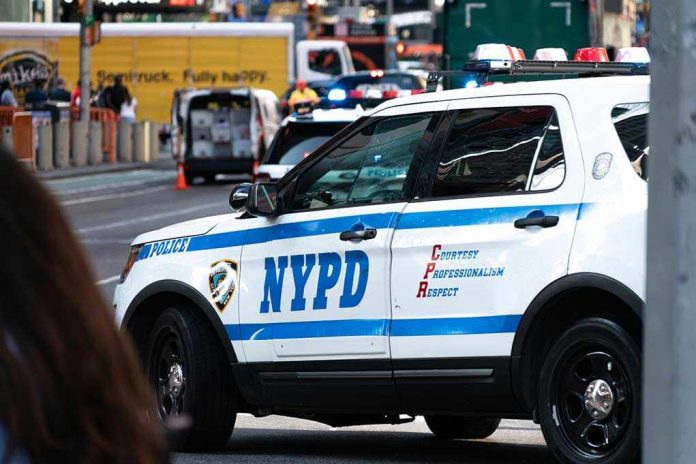
When a woman runs down a New York police officer and the judge’s answer is just two years behind bars, the city’s sense of justice—and safety—hangs by a thread.
Story Snapshot
- Sahara Dula, 25, purposely ran over an NYPD officer while high, shouting anti-police slurs at the scene
- Manhattan judge sentenced her to only two years, sparking outrage and debate over public safety
- The case highlights deep divisions over law enforcement, judicial discretion, and criminal justice reform
- Police advocates decry the lenient sentence as a threat to officer morale and deterrence
Deliberate Attack, Defiant Aftermath: The Incident in Manhattan
Sahara Dula did not stumble into criminal notoriety by mistake. According to court records and eyewitness accounts, she was under the influence when she got behind the wheel that night in Manhattan. She saw an NYPD officer, accelerated, and intentionally struck him. The act was not a split-second lapse but a calculated attack, punctuated by her unfiltered rage at law enforcement. As paramedics tended to the injured officer, Dula reportedly shouted, “F–k these cops,” a statement she would not retract but reinforce in subsequent interviews and court proceedings. The case was shocking for its brazenness and direct contempt for the badge, immediately drawing reaction from the city’s law enforcement community.
Legal observers immediately noted the gravity of Dula’s admissions. There was no ambiguity—she not only confessed but justified her actions by framing them as a message to police. Her defense team painted a portrait of a troubled young woman, but the prosecution, led by the Manhattan District Attorney’s Office, pressed for a sentence that would reflect the severity of her crime and the deliberate threat to a public servant. The courtroom was thick with tension when the verdict was read, as officers and their families awaited what many hoped would be a strong statement of accountability.
The Sentencing: Two Years, Many Questions
On October 29, 2025, the case reached its climax. The presiding judge handed down a two-year prison sentence—far less than what many expected given the intentional attack and public derision of police. The reaction was swift and severe. Law enforcement unions and conservative commentators called it a “slap on the wrist.” In their eyes, the judge’s decision not only failed to match the crime’s seriousness but sent a dangerous message: violence against police could be met with leniency. The District Attorney’s Office, while declining to publicly criticize the judge, acknowledged the frustration within the NYPD and the wider community.
Public debate erupted across the city. The lenient sentence became a talking point on radio shows, in police roll calls, and on social media platforms. To many New Yorkers and Americans watching from afar, the case was emblematic of a broader trend—progressive crime policies that, critics argue, prioritize rehabilitation over deterrence, even when the victim is a uniformed officer. The judge’s rationale was not made fully public, further fueling speculation and anger over the court’s priorities.
Fallout and the Broader Battle Over Police and Justice
The aftershocks of the sentencing continue to ripple through New York’s law enforcement community. Officers report feeling less valued and more vulnerable, with some unions warning of a chilling effect on recruitment and morale. Police advocates have renewed calls for mandatory minimum sentences for attacks on officers, arguing that any ambiguity in punishment weakens both deterrence and respect for the law. Meanwhile, progressive voices contend that the case, while disturbing, should not be weaponized to roll back sentencing reforms or further empower law enforcement at the expense of civil liberties.
Legal scholars and sociologists see the incident as a flashpoint in the national conversation about criminal justice. The deliberate nature of Dula’s attack complicates the argument for leniency, even among those sympathetic to systemic reform. The episode raises uncomfortable questions: How should the justice system respond to overt violence against police? What balance should be struck between deterrence and rehabilitation? And, crucially, what message does such a sentence send—to officers, offenders, and the public at large?
Implications for Police, Public Trust, and Policy
In the short term, the NYPD braces for fallout. Morale has taken a hit, and there are calls for legislative action to ensure stiffer penalties in similar cases. For many in law enforcement, the concern is not just for their own safety, but for the precedent now set. If the courts appear unwilling to take the most direct attacks on officers seriously, what confidence can the public have in the system’s ability to protect them? Manhattan’s residents, too, are left to wonder whether the city’s justice system can balance compassion with accountability.
Long term, this case may shape debates far beyond New York. Activists on both sides have seized on the details: some demanding tougher laws, others warning against reactionary policies that could erode hard-won reforms. For now, Sahara Dula sits in state prison, her name a touchstone in the city’s ongoing battle over crime, policing, and what justice in America should mean.



